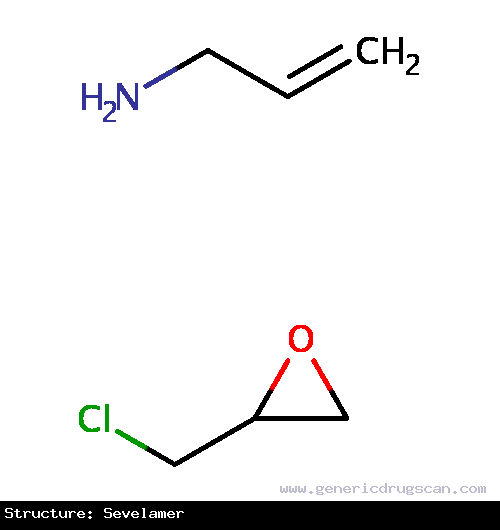Sevelamer Drug: Indication, Dosage, Precaution, Side Effect , Storage, Category Type and corresponding Brands - www.genericdrugscan.com
Sevelamer
Drug Status in USA : ApprovedDrug Status in Canada : Approved
pronunciation
pronounced as (se vel' a mer)
Why is this medication prescribed?
Sevelamer is used to treat high blood levels of phosphorus in patients with kidney disease who are on dialysis. It binds phosphorus that you get from foods in your diet and prevents it from being absorbed into your blood stream.
This medication is sometimes prescribed for other uses; ask your doctor or pharmacist for more information.
How should this medicine be used?
Sevelamer comes as a capsule to take by mouth. It is usually taken three times a day with meals. Swallow the capsules whole. Do not chew or take the capsule apart before you swallow it. Follow the directions on your prescription label carefully, and ask your doctor or pharmacist to explain any part you do not understand. Take sevelamer exactly as directed. Do not take more or less of it or take it more often than prescribed by your doctor.
Sevelamer controls high blood levels of phosphorus which is a common problem in patients with kidney disease, but it does not cure the disease. Continue to take sevelamer even if you feel well. Do not stop taking sevelamer without talking to your doctor.
What are the precautions to be followed?
Before taking sevelamer,- tell your doctor and pharmacist if you are allergic to sevelamer or any other drugs.
- tell your doctor and pharmacist what prescription and nonprescription medications you are taking, including medications for seizures such as carbamazepine (Carbatrol, Epitol, Tegretol), ethosuximide (Zarontin), phenobarbital (Solfoton), and phenytoin (Dilantin); medications for irregular heartbeats such as amiodarone (Cordarone, Pacerone), digoxin (Lanoxin), diltiazem (Cardizem, Dilacor, Tiazac, others), disopyramide (Norpace), dolfetilide (Tikosyn), flecainide (Tambocor), ibutilide (Corvert), mexiletine (Mexitil), moricizine (Ethmozine), procainamide (Procanbid, Pronestyl, Rhythmin), propafenone (Rythmol), propanolol (Betachron ER, Inderal), quinidine, sotalol (Betapace), tocainide (Tonocard), and verapamil (Calan, Isoptin, Verelan, others); cyclosporine (Neoral, Sandimmune, Gengraf); lithium (Eskalith, Lithobid, others); theophylline (Slobid, Theo-Dur, others); warfarin (Coumadin); and herbal products and vitamins.
- tell your doctor if you have or have ever had difficulty swallowing, a stomach or bowel problem such as blockage of your stomach or intestines, or surgery on your stomach or intestines.
- If you are taking other medications, you should take them at least 1 hour before you take sevelamer or 3 hours after you have taken sevelamer, to prevent binding of your other medications.
- tell your doctor if you are pregnant, plan to become pregnant, or are breast-feeding. If you become pregnant while taking sevelamer, call your doctor.
- if you are having surgery, including dental surgery, tell the doctor or dentist that you are taking sevelamer.
What are possible side effects of this medication ?
Sevelamer may cause side effects. Tell your doctor if any of these symptoms are severe or do not go away:- upset stomach
- diarrhea
- vomiting
- gas (flatulence)
- constipation
- headache
- cough
How to store the medication and dispose it of after its use later?
Keep this medication in the container it came in, tightly closed, and out of reach of children. Store it at room temperature and away from excess heat and moisture (not in the bathroom).
Unneeded medications should be disposed of in special ways to ensure that pets, children, and other people cannot consume them. However, you should not flush this medication down the toilet. Instead, the best way to dispose of your medication is through a medicine take-back program.
Drug Category/Class
- Chelating Agents
- Drugs for Treatment of Hyperkalemia and Hyperphosphatemia
- Drugs for Treatment of Hyperkalemia and Hypophosphatemia
- Drugs for treatment of hyperkalemia and hyperphosphatemia
| Prescribed | For the control of serum phosphorus in patients with Chronic Kidney Disease (CKD) on hemodialysis. |
| Weight : | 149.619 |
| Structure | Sevelamer |
 | |
| Formula | C6H12ClNO |
Sevelamer has 17 Brands listed
Search Generic Drugs alphabetically
